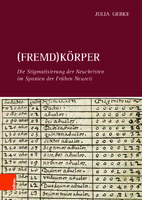(Fremd)Körper
Die Stigmatisierung der Neuchristen im Spanien der Frühen Neuzeit
Author(s)
Gebke, Julia
Collection
Austrian Science Fund (FWF)Language
GermanAbstract
The ideology of purity-of-blood (limpieza de sangre) divided
early modern Iberian society into two different classes: Old
Christians and New Christians. New Christians, i.e. Conversos (converted Jews) and Moriscos (converted
Muslims), but also their offspring, were thought to be inferior Christians and always tending towards apostasy. At the turn of the 17th century an increased interest in bodily markers to proof the presumed inferiority of the so-called New
Christians can be observed. The book focusses on the question how the apologists of the purity-of-blood statutes
used the idea of inherited bodily markers to promote a
genealogical racism in early modern Iberia. Um Mechanismen der Ausgrenzung, Diskriminierung und Verfolgung zu durchschauen, ihnen vorzubeugen und sie
beizeiten zu bekämpfen, müssen wir sie verstehen. Die
Blutreinheitsideologie (span. limpieza de sangre) unterteilte
die frühneuzeitliche iberische Gesellschaft in zwei Gruppen:
Altchristen und Neuchristen. Julia Gebke analysiert in ihrer
Arbeit anhand von drei durch die Blutreinheitsideologen
propagierten körperlichen Markierungen im Schnittfeld von Theologie und Medizin die verstärkte Stigmatisierung des
neuchristlichen Körpers. Neuchristliche Muttermilch, jüdisch-männliche Menstruation und neuchristlicher Körpergeruch
wurden, speziell an der Schwelle vom 16. zum 17.
Jahrhundert, von Befürwortern und Gegnern der
Blutreinheitsideologie kontrovers diskutiert.


 Download
Download